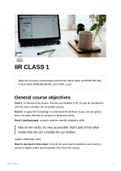📄
IIR CLASS 1
https://s3-us-west-2.amazonaws.com/secure.notion-static.com/53bc79f1-65a
4-41e4-954b-260fb3b02dfc/IIR_LECTURE_1.pdf
General course objectives
Goal 1: to introduce key issues, theories and debates in IR, it's just an introduction
with the main concepts. IR constantly evolves.
Goal 2: to apply this knowledge to understand IR all these issues, we are gonna
learn concepts, theories to compare to historical events,
Goal 3 (workgroups): to teach students specific academic skills.
War on the rocks, it's very accessible: that's part of the other
media that we can consider for our studies.
Twitter: #IIRLeiden 2021
How to succeed in this class: If we do our work well in advance, we're likely to
receive a higher grade and remember more from the course.
IIR CLASS 1 1
, 🌟 "80% of success is just showing up"
Evaluation based on a final exam (60%)
October 28th, 13.00
Final exam based on material in textbook and lectures. The exam is 40 questions
multiple-choice, it is scheduled to have it on campus (TBC)
Workgroup assignments.
Some basic ground rules. Regularly attending and or watching the video material
reading assigned texts, and taking notes.
Not everything discussed in class will be captured by the assigned readings,
therefore, you need to be alert and take notes when attending or watching the
lectures. And don't share the video material it is only useful for us and our exams.
Video and lecture slides will be posted online.
For questions about the workgroups, we have to ask the workgroup coordinator.
iir.presenterswall.nl
Why does IR matter?
If you are here that means you might have already an idea, impact on daily lives
(everything is interconnected, because of the events happening nowadays in the
different countries and bonds between different countries and international
organizations). It's never been a better time to study IR. IR is made up of events and
debates. Not all of the concepts apply to all the situations that we're experiencing.
They teach us how to ask questions to ourselves concerning a certain event. It's
critical thinking. Helps ask the rights questions for contemporary phenomena. What
should we focus on. And try to answer these questions. It's important to think
theoretically when answering these questions. It's important to ask the right
questions such as why has this happened or what led to this and etc.
But why does IR really matter?
example
Higher education as a transnational and global phenomenon: the movement of
individuals (faculty, students and staff) and ideas between nations and cultures.
There are individuals moving. It's a brand new phenomenon. IR is the history of
IIR CLASS 1 2
, relations between the states. And how individuals move. We have IR also between
the ideas discussed in the classroom because the individuals are from different
cultures and origins. IR can help understand how we got here. We take it for granted
but for some people, it was very difficult to travel. It has never been that easy to go
study abroad. Not only financially but we're talking about the permissions we need to
cross the borders of the different countries. IR can help to understand the
educational flow that we see nowadays.
In the lecture, we used higher education as an example of how
international relations affect our daily lives. The
internationalisation of ideas means that ideas move along with
students, teachers who go study and teach abroad. This
contributes to ideas being known and shared by a greater
community across the world. We also discussed how some
states use higher education and the introduction of specific
ideas, theories and concepts to students who come to study in
this country and then travel back home. This can lead these
students to hold favourable views of the state in which they
studied. This way to develop a degree of influence through
educational exchanges is an example of soft power.
Can higher education affect the future of IR? Useful concepts: transnationalism
(hybrid concept between national and international), migration, soft power, public
diplomacy, sovereignty, hegemony (most of the theories discussed in classes from
the US or other states so maybe there's is the prevalence of the ideas and culture of
a certain country),...
example
Competition between the US and China also through the Visa. Biden keeps costly
Trump Visa Policy Denying Chinese Grad Students. But it's actually in the interest of
the US having Chinese Grad Students, it's a conflict between the elites. IR can
explain a lot of movements of the students etc.
We are actors of IR as we speak
What can IR tell us about the Covid19 crisis?
IIR CLASS 1 3
, Realism: Covid19 pandemic only
confirmed anarchy in world politics, no
one can trust each other.
Liberalism: institutions and
interdependence have ensured
cooperation between states. It has
actually been some cooperation. We do
have some coordination.
Constructivism: Covid19 is what
states make of it. For instance, is
Covid19 a foreign virus/threat? Is it a
security issue? Is it a global health
issue/Global public bad?
Who's right between these schools? It depends because there are very different
schools and answers depend on different assumptions and doing hypotheses is the
only thing we can do we cannot say Time will tell. There are no clear answers some
school can answer a question better but other cannot do that and so on.
Let's make sense of the world
Sometimes borders cannot help us solve some problems such as a pandemic
We referred to these two examples when discussing the Covid19
crisis. "Vaccine nationalism" is a term that has been used to
account for when states decide to develop their own vaccines or
purchase vaccines solely for their own national use. By contrast,
"vaccine diplomacy" is a label used by some states to publicize
their efforts to export and share vaccine reserves they may have
with other states.
IIR CLASS 1 4





